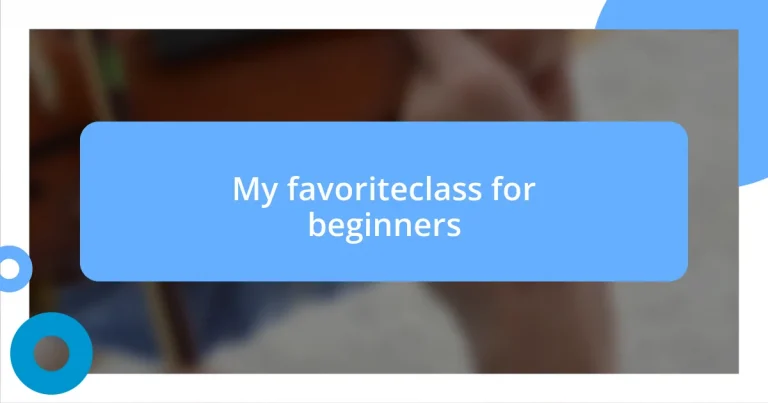Key takeaways:
- Beginner classes foster a supportive community, promoting shared learning and camaraderie among students.
- Key learning strategies include breaking study sessions into smaller increments, embracing mistakes, and teaching others to enhance understanding.
- Staying motivated involves setting achievable goals, engaging with like-minded peers, and reflecting on personal motivations for learning.
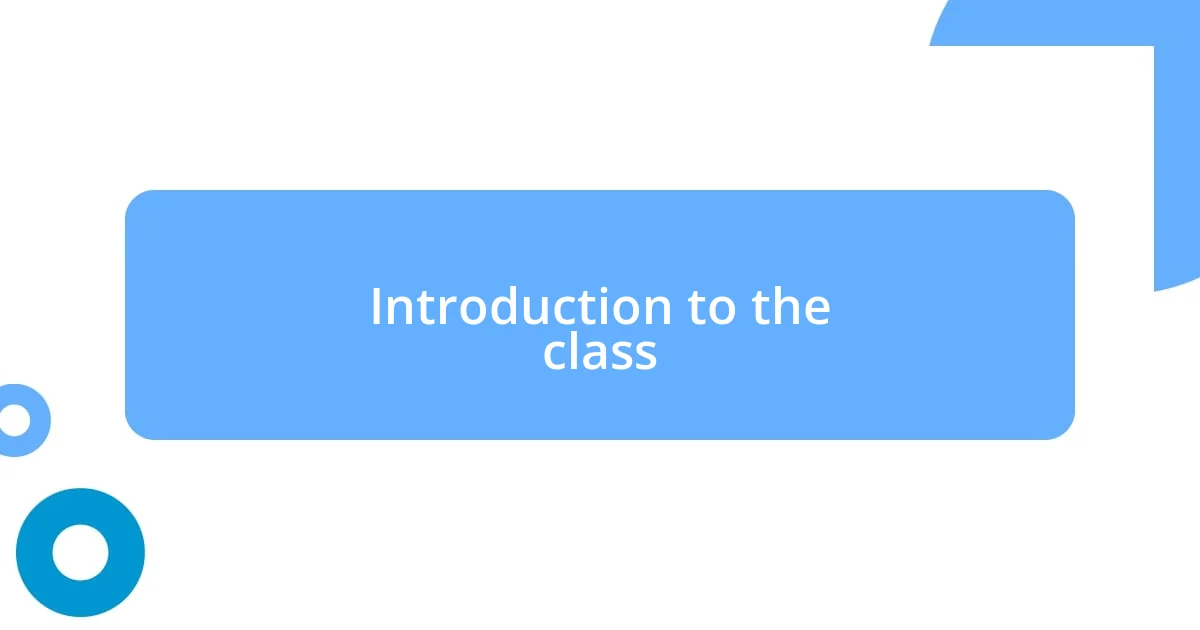
Introduction to the class
Stepping into this class was like opening a door to a new world for me. I remember feeling a mix of excitement and apprehension, wondering if I would be able to keep up with everything. Have you ever felt that way about trying something new?
In this space, you quickly realize that everyone starts as a beginner at some point. The supportive environment allows you to stumble, learn, and grow together with your classmates. I found it refreshing to see people share their struggles, and it created an atmosphere of camaraderie that is truly motivating.
Every lesson felt engaging and practical, which made a huge difference in my learning. I recall one particular session where we tackled a challenging concept, and by the end, we were all cheering for each other’s progress. It’s these moments of connection and achievement that make this class not just a learning experience but a journey you want to be part of.
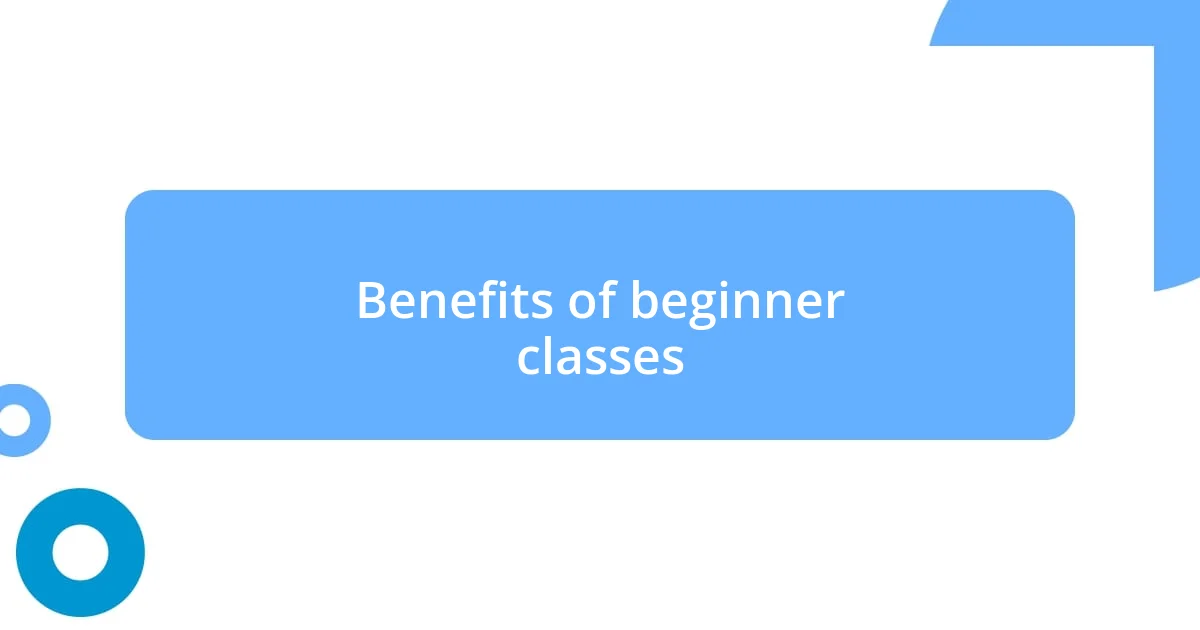
Benefits of beginner classes
Taking a beginner class opens the door to new skills in a structured way. In my experience, this structure reduces overwhelm and builds confidence. I vividly remember my first session; I left the room feeling like I’d just accomplished my first major mountain climb, even if it was just a single step.
One of the greatest benefits I’ve noticed is the community aspect of these classes. We all came together with varying levels of experience, and that blend proved invaluable. Sharing tips and learning from each other’s mistakes reminded me of those group projects in school – learning together makes the process richer and often more enjoyable.
Moreover, beginner classes provide essential foundational knowledge that ensures we’re not just memorizing facts but understanding concepts deeply. I recall a moment when the instructor broke down a complex idea into relatable examples. That clarity transformed my understanding and sparked an eagerness to dive deeper. Have you ever experienced that “aha” moment? It’s those instances that fuel our passion for learning!
| Benefit | Description |
|---|---|
| Structured Learning | Guided approach reduces overwhelm and builds confidence. |
| Community Support | Opportunities to learn from peers enhance the experience. |
| Foundational Knowledge | Deep understanding rather than rote memorization. |
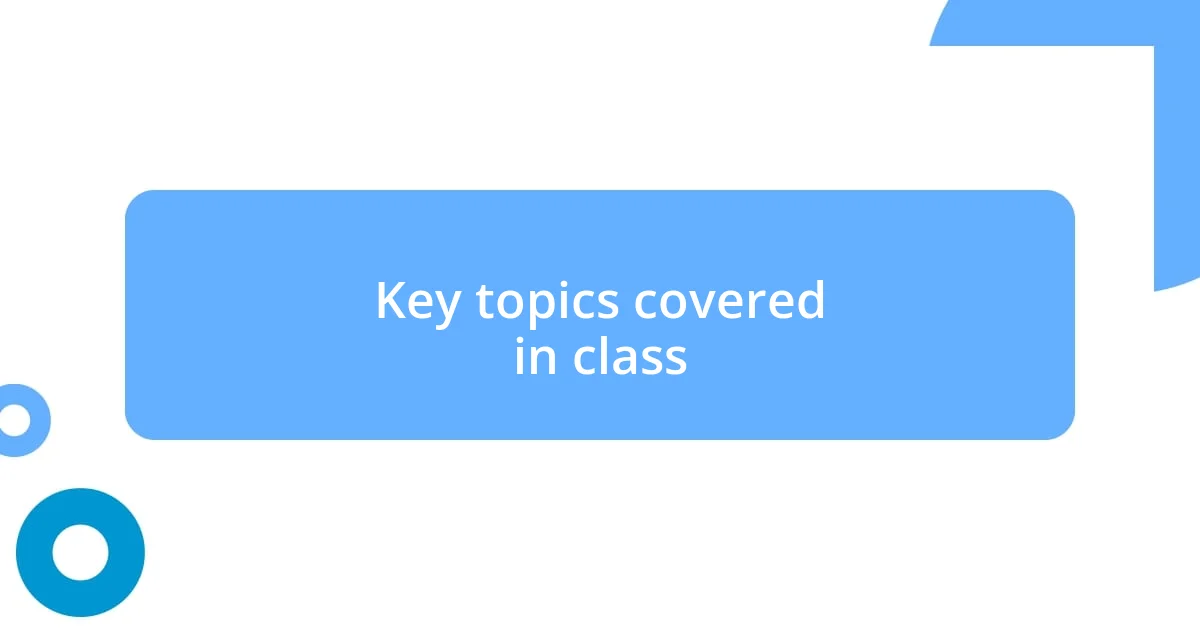
Key topics covered in class
Key topics covered in class
As we dove deeper into the material, I realized how crucial each topic was in weaving the entire learning experience together. One moment that stands out was when we explored the foundational principles—those guiding concepts that seemed so abstract at first. Suddenly, everything started to connect, and I felt like I was piecing together a puzzle. It’s exciting when you can visualize how each part fits into the bigger picture.
Here’s a snapshot of some of the key topics we covered:
- Basic Concepts: Understanding the fundamental principles that serve as the backbone of the subject.
- Hands-on Applications: Engaging in practical exercises that reinforce theoretical knowledge and promote confidence.
- Collaborative Projects: Working in groups that foster communication, teamwork, and shared learning experiences.
- Problem-Solving Techniques: Learning methods to tackle challenges effectively, encouraging a proactive approach.
Remember that exhilarating feeling of finally grasping something you once found intimidating? That’s what these topics aim to achieve, turning confusion into clarity!
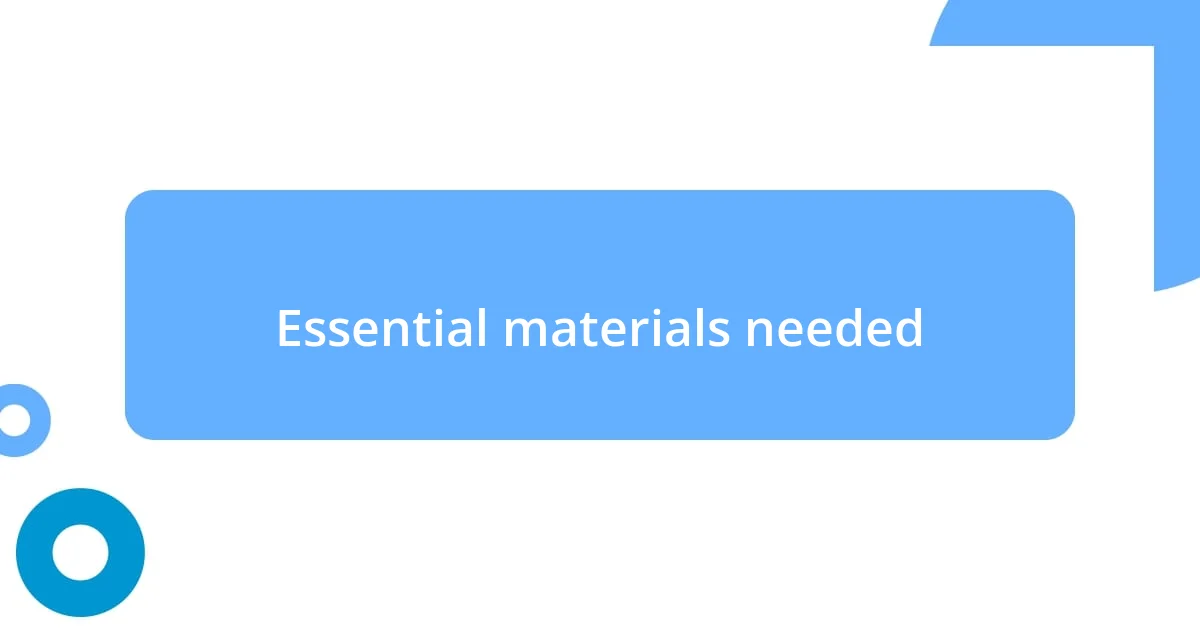
Essential materials needed
When it comes to essential materials needed for a beginner class, the right tools can make a world of difference. I still remember the first time I gathered my supplies: a notebook, pens in various colors, and, of course, reference books that I considered my “learning companions.” Each item held a promise of new knowledge waiting to unfold, and I often found myself flipping through those pages, feeling both excited and a little intimidated.
A good quality notebook can become your best friend. I personally prefer lined pages over blank, as it gives me some structure while jotting down notes or sketches. One day, I started doodling alongside my thoughts during a lecture, and to my surprise, those visuals helped me retain concepts better than just text alone! Have you tried merging art and learning? It’s not just fun; it’s incredibly effective.
Lastly, don’t underestimate the importance of digital tools. Whether it’s a dedicated app for organizing your notes or a simple file on your computer, having your materials accessible can really boost your learning experience. I remember creating a document filled with helpful links and reference images, which became essential when reviewing for quizzes. Finding what works best for you can transform study time into an enjoyable exploration rather than a tedious chore. What materials have you found indispensable in your learning journey?
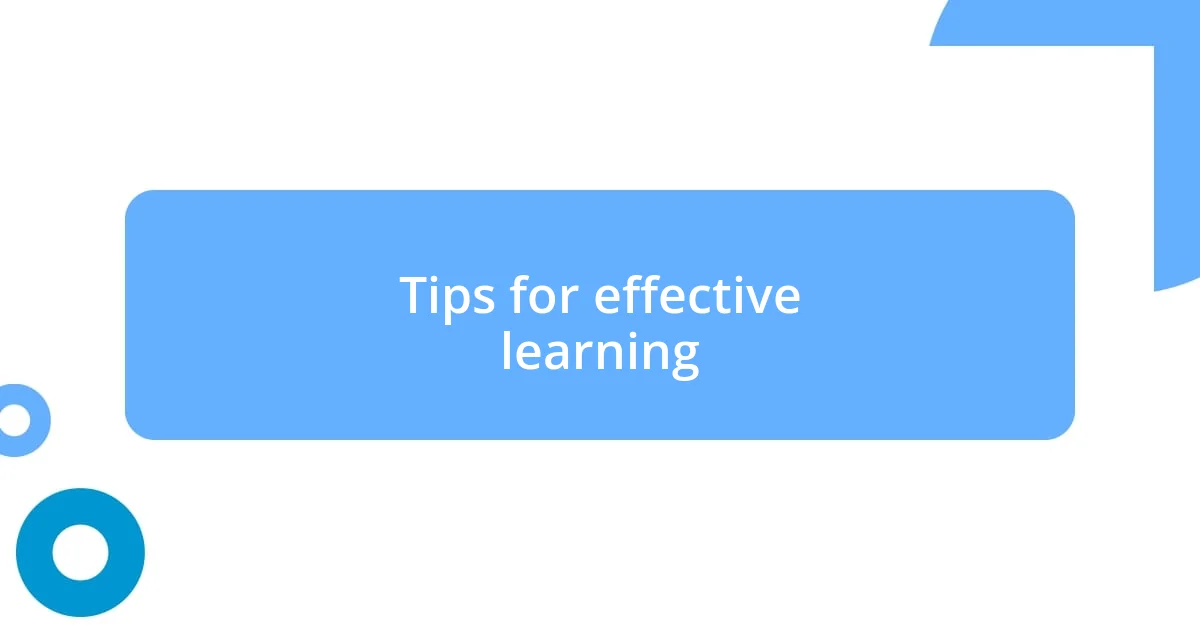
Tips for effective learning
Effective learning often requires a blend of strategies tailored to your personal style. I remember sitting down after a long day and deciding to break my study sessions into smaller increments. Instead of cramming for hours, I’d spend just 25 minutes focused and then take a five-minute break. This approach not only kept me refreshed but also sharp-minded, allowing me to absorb complex material more easily. Have you ever tried the Pomodoro Technique? It can transform your productivity!
Another key tip is to embrace mistakes as part of the learning process. I vividly recall making numerous errors while working on a project, feeling disheartened at first. But each mistake was like a stepping stone, carrying me closer to a more profound understanding. By discussing my missteps with classmates, I found that we learned collectively and turned setbacks into insights. Isn’t it fascinating how our errors can guide us to clearer paths?
Lastly, I can’t stress enough the power of teaching others. When I volunteered to help a peer struggling with a difficult concept, I discovered that explaining it actually deepened my own understanding. It’s a full-circle moment—helping someone else reinforces your knowledge and builds confidence. Have you ever considered how sharing your insights could solidify your learning? Embracing these methods genuinely transforms the educational journey into a more enriching experience.
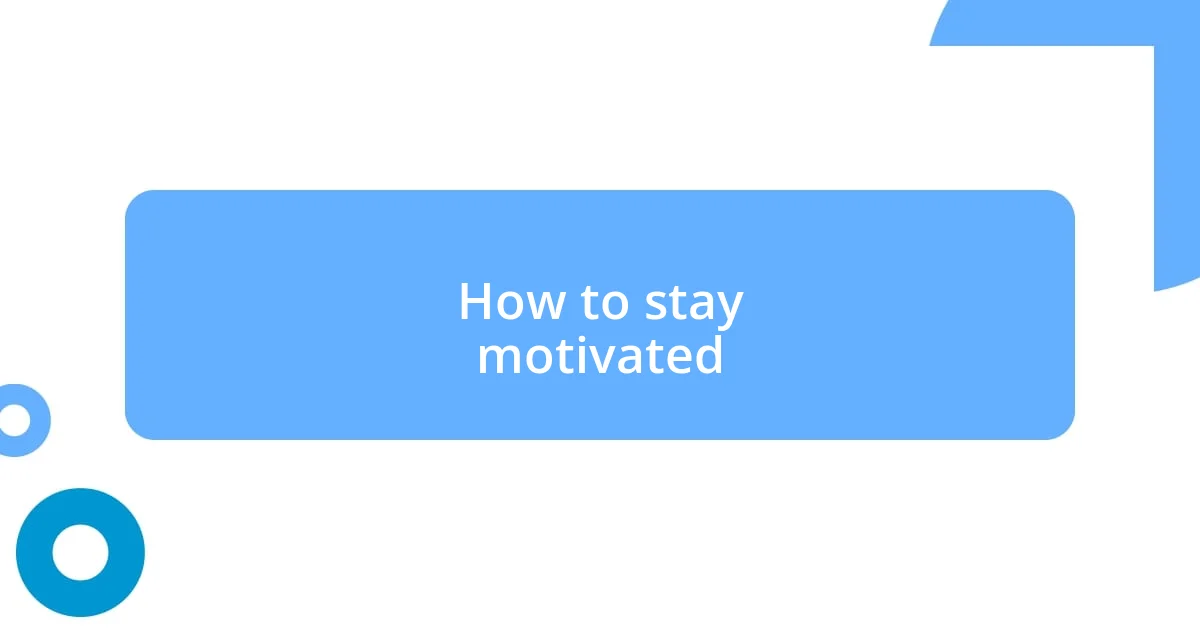
How to stay motivated
Staying motivated can be a real challenge, especially when the initial excitement fades. I recall those moments when my enthusiasm for a class dwindled after a few weeks; it felt like a rollercoaster ride of highs and lows. What helped me was setting small, achievable goals. For example, I would celebrate completing a particularly tough assignment, often treating myself to a favorite snack or a leisurely stroll. What small rewards can you incorporate into your routine to keep that spark alive?
Another strategy I found effective was surrounding myself with like-minded peers. I joined a study group that met regularly, and boy, did it change everything! Our discussions often sparked new ideas, and simply being around motivated individuals reignited my passion. Have you thought about how the company you keep influences your motivation? The energy from those sessions pushed me to stay accountable and engage more deeply with the material.
Lastly, remembering why I started my journey in the first place always brought me back to my core motivation. I still keep a journal filled with my initial inspirations and aspirations, which I revisit whenever I feel stuck. This reflection acts like a personal pep talk—reminding me of the excitement and goals that ignited my desire to learn. How often do you take a moment to reflect on your reasons for pursuing a new skill? Taking that time can refocus your mindset and keep you moving forward.
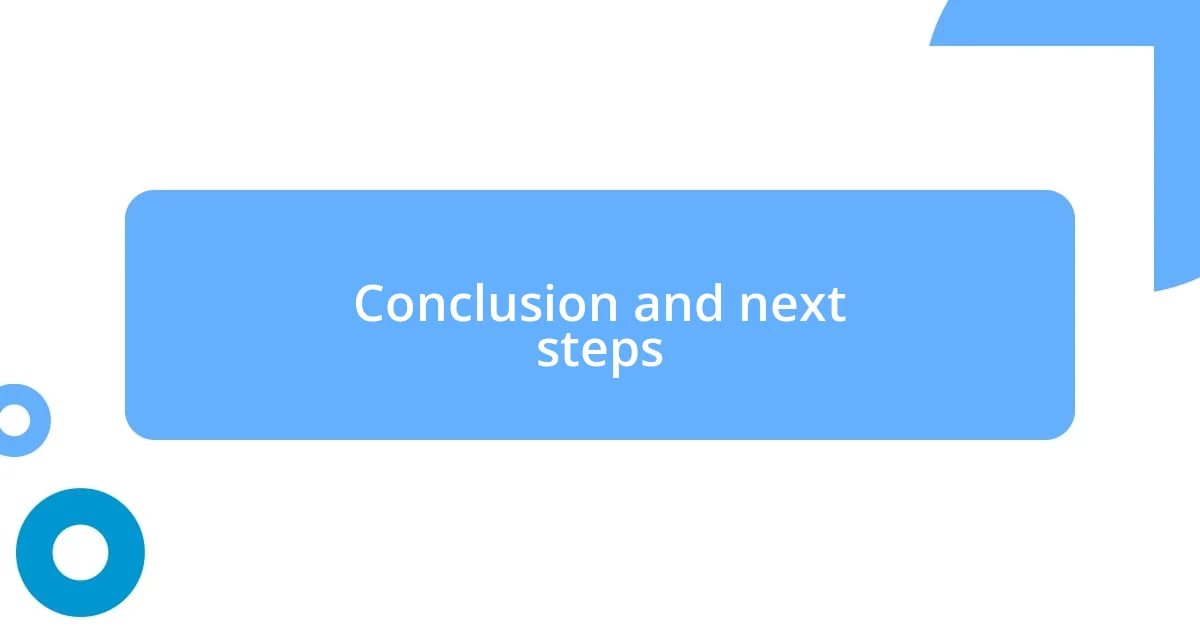
Conclusion and next steps
As I wrap up this journey through effective learning and motivation, I can’t help but reflect on the power of persistence. There were times when I felt overwhelmed, staring at a mountain of material, wondering if I’d ever conquer it. Whenever that doubt crept in, I’d remind myself that every small step counts. It’s this mindset that leads to breakthroughs. What progress have you measured in your own learning adventure?
Looking ahead, it’s vital to think about how you can implement these techniques in a way that feels authentic to you. I remember setting aside weekends to dive into projects that sparked my interest. This consistent engagement kept my curiosity alive and, surprisingly, led to some of my best learning moments. How can you carve out time in your schedule for exploration and growth? The answer could be as simple as prioritizing just one new topic each month.
Ultimately, this journey is yours to shape. Whether it’s through peer discussions, setting achievable milestones, or embracing mistakes, every facet contributes to a richer learning experience. I encourage you to embrace the excitement of the unknown. What will your next step look like, and how will it push you toward your goals? The beauty of this process is that you have the opportunity to craft it in a way that’s uniquely satisfying for you.












